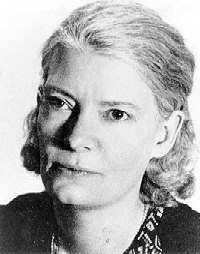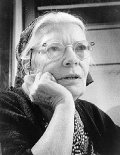
Dorothy Day, one of the cofounders of the Catholic Worker, was a woman who understood people. She did not hold herself above others or believe that she was any better of worse than anyone else. Dorothy Day believed that there must be justice and equality for everyone. She started the Catholic Worker because of her deep desire to help others, praise others, and commit to a world of peace through pacifism. Arriving at her goal was difficult and an inspiration for all.
Dorothy Day did not start out as a Catholic. She did not start out accepting and unquestioning her values, instead, she searched for the meaning of life. As a child she enjoyed psalms, the New Testament, and Episcopalian hymns, but this did not automatically lead her into a life of religion. Instead, at school, she concentrated on the Marxist theory, and scorned others for their crutch, their opiate, their religion. She still wanted to help others, the masses, but not through the love of God. After finishing school she moved to New York City and worked for a Socialist newspaper, writing against poverty and unemployment.
It was during this phase of life that Dorothy was arrested at the White House for protesting against political prisoners. While in jail she asked for a bible, not acknowledging that she needed comfort, guidance, or solace, but just to have something to read. This was the first step. Back in New York City she began to attend early morning Mass because she needed the atmosphere of praise.
Dorothy's personal life was in a constant state of upheaval. She was a vibrant emotional woman who felt things fully. She loved as a woman, as a relative, and as a friend and this led her to be more accepting of others. Her love life was never in a case of stasis. She had lived with a newspaper man, Lionel Moise, while practicing as a nurse, and may have tried to commit suicide during their relationship. She aborted a pregnancy for fear of his leaving her, only to have him leave her. This still did not bring her back to God. Dorothy married Barkeley Tobey a few months later and divorced him after a year. She was unhappy and unfulfilled. Then she met Forster Batterham with whom she had a common law marriage, and later a daughter Tamar Teresa.
For Dorothy several things happened in her life that forced her to make difficult and painful decisions. While in New York she began to feel the need to praise God among others. Religion imbued her life, filled her thoughts and motions. She was thankful for her life and wanted God to know of her gratitude. When she gave birth to her daughter the thrill of life was even stronger. She wanted to join the Catholic church and get baptized. However, if Dorothy were to do this, she would have to give up Forster, for he was an atheist and against God and the baptisms. It was a choice between the spiritual love of God, or the physical love of a man. Dorothy, after agonizing, chose God. She remained celibate for the rest of her life.
 After making such a difficult choice, Dorothy, in May 1933, with friend Peter Maurin, founded the Catholic Worker. It began as a newspaper that sold for one cent, but developed into an entire movement. They started houses of hospitality, where people could go to relax and pray, eat and sleep. Dorothy felt the need to help people and through her faith was able to do this selflessly. She believed in the dignity and rights of the workers, unions, the equality of blacks, and the need to improve social situations here and abroad. Dorothy believed that voluntary poverty and pacifism were the way to obtain these goals. Her faith background in socialism led her to dream about a society where there were not such disparities between wealthy and poor, but rather a society based on needs and abilities.
After making such a difficult choice, Dorothy, in May 1933, with friend Peter Maurin, founded the Catholic Worker. It began as a newspaper that sold for one cent, but developed into an entire movement. They started houses of hospitality, where people could go to relax and pray, eat and sleep. Dorothy felt the need to help people and through her faith was able to do this selflessly. She believed in the dignity and rights of the workers, unions, the equality of blacks, and the need to improve social situations here and abroad. Dorothy believed that voluntary poverty and pacifism were the way to obtain these goals. Her faith background in socialism led her to dream about a society where there were not such disparities between wealthy and poor, but rather a society based on needs and abilities.
Dorothy Day was constantly writing, lecturing, and nonviolently demonstrating, for others and for herself. She needed the community of praise and saw that need in others. She wanted to share her wealth of knowledge, experience, and love so that others might prosper. Dorothy Day was a woman who changed her life and wanted to help others do the same. Her faith and love of God enabled her to make many changes and her legacy still lives on. Back to Top

